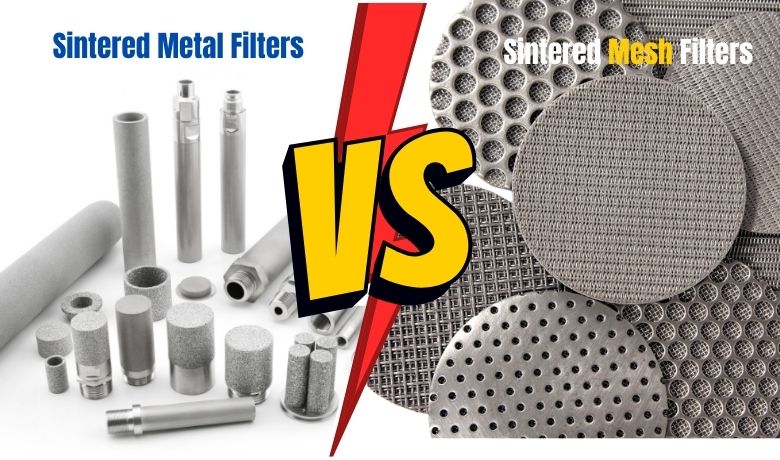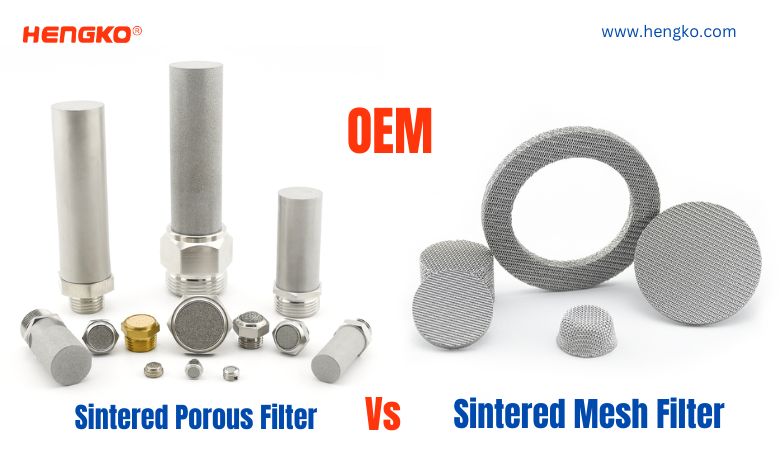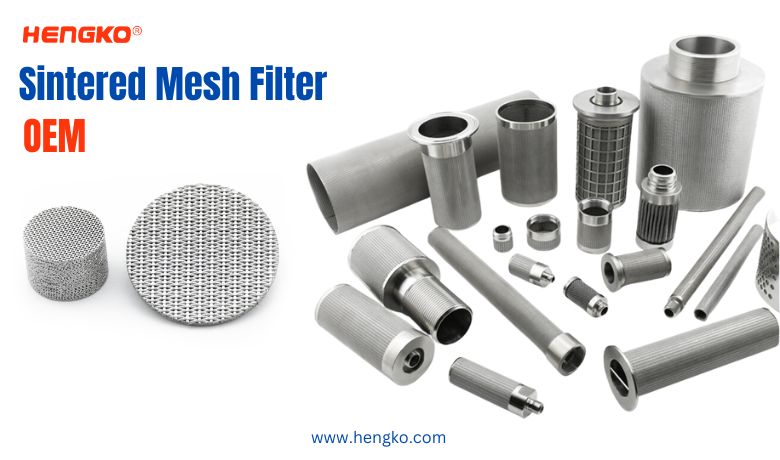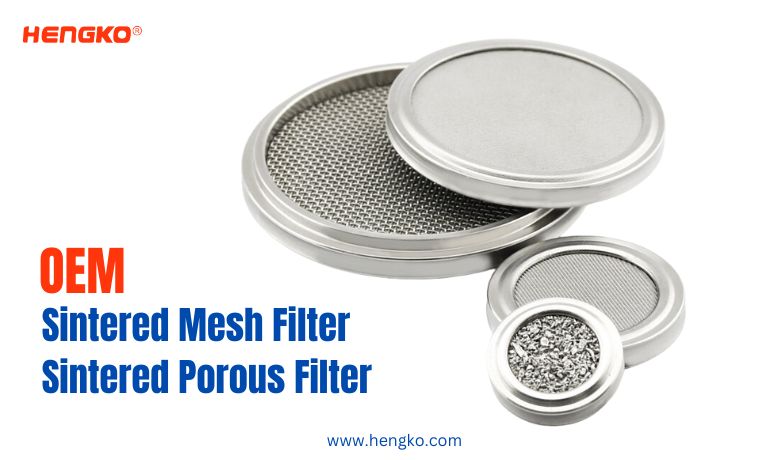
In industrial filtration, selecting the right filter is crucial for achieving optimal performance.
Two popular options—sintered filters and sintered mesh filters—are often used interchangeably,
but they have key differences that can impact their effectiveness in specific applications.
In this blog, we will explore the detailed differences between sintered filters and sintered mesh filters,
examining various factors to help you understand their unique characteristics and
how they can best meet your filtration needs.
Why Sintered Metal Filters and Sintered Mesh Filters both are Popular ?
As you know, Sintered metal filters and sintered mesh filters are widely used in industrial filtration due to their
high durability, efficiency, and ability to withstand extreme conditions. Here’s why they stand out:
*Sintered Metal Filters:
Made from stainless steel, bronze, or alloys, these filters are created by compacting and sintering metal powders
to form a rigid, porous structure.
They are ideal for high-strength applications and environments with extreme temperatures and pressures.
*Sintered Mesh Filters:
Constructed from multiple layers of woven metal mesh, sintered mesh filters provide precise filtration
by fusing the mesh layers to form a stable, customizable filtration medium.
They are perfect for applications that require specific pore sizes.
Applications:
Both types of filters are used across industries such as:
*Chemical processing
*Pharmaceuticals
*Food and beverage
*Petrochemicals
Choosing the Right Filter:
The selection depends on factors such as:
*Type of particles to be filtered
*Operating conditions (temperature, pressure)
*Desired filtration efficiency
Below, we make some outline the key differences between sintered metal filters and sintered mesh filters to
help you make the right choice for your application.
Section 1: Manufacturing Process
The manufacturing process is the bedrock upon which the performance and characteristics of any filter are built.
Sintered filters are manufactured by compacting metal powders into a desired shape and then heating them
to a temperature below their melting point, causing the particles to bond together.
This process creates a rigid and porous structure that can filter out impurities from fluids or gases.
Common materials used in sintered filters include stainless steel, bronze, and other alloys.
Here’s a comparison table for sintered filters vs. sintered mesh filters:
| Feature | Sintered Filters | Sintered Mesh Filters |
|---|---|---|
| Manufacturing Process | Compacting metal powders and heating below melting point | Layering and sintering woven metal mesh sheets |
| Structure | Rigid, porous structure | Strong, layered mesh structure |
| Materials | Stainless steel, bronze, alloys | Woven metal mesh |
| Strength | High strength, suitable for extreme conditions | Strong, stable, suitable for high-pressure applications |
| Filtration Precision | Suitable for general filtration | Customizable pore sizes for precise filtration |
| Applications | Harsh environments, high temperature/pressure | Precise filtration, customizable requirements |
Section 2: Material Composition
The material composition of a filter is integral to its performance and longevity. Sintered filters can be crafted from
a variety of materials including stainless steel, bronze, and other specialized alloys.
The choice of material often depends on the application, as different materials offer different benefits.
For instance, stainless steel provides excellent resistance to corrosion and is suitable for high-temperature applications,
while bronze is typically used in situations where resistance to fatigue and wear is crucial.
Here’s a table comparing the material composition of sintered filters vs. sintered mesh filters:
| Filter Type | Material Composition | Benefits |
|---|---|---|
| Sintered Filters | Stainless steel, bronze, and specialized alloys | - Stainless Steel: Excellent corrosion resistance, high-temperature tolerance - Bronze: Resistant to fatigue and wear, good for high-stress applications |
| Sintered Mesh Filters | Typically made from various grades of stainless steel | - Stainless Steel: High corrosion resistance, durability, maintains integrity in harsh conditions |

Section 3: Filtration Mechanism
The filtration mechanism is critical in determining a filter’s efficiency at removing impurities from fluids or gases.
Here's how sintered filters and sintered mesh filters work:
Sintered Filters:
*Utilize a porous structure to trap particles.
*Pore size can be controlled during manufacturing for application-specific customization.
*Rigid structure makes them ideal for high-pressure applications.
Sintered Mesh Filters:
*Rely on the precision of woven mesh to capture particles.
*Multiple layers create a tortuous path, effectively trapping impurities.
*Customizable mesh allows for precise control over pore size.
*Ideal for applications with consistent particle size, ensuring accurate filtration.
This comparison highlights the unique filtration mechanisms of each type,
helping to choose the right filter based on the application’s needs.
Section 4: Pore Size and Filtration Efficiency
Pore size plays a crucial role in a filter’s ability to capture particles.
Here’s how it impacts sintered filters and sintered mesh filters:
Sintered Filters:
*Available in a range of pore sizes that can be customized during manufacturing.
*Suitable for applications with varying filtration needs.
*Offers flexibility in handling different particle sizes.
Sintered Mesh Filters:
*Pore sizes can be precisely controlled due to the woven mesh structure.
*Layers of mesh can be adjusted to achieve exact pore sizes.
*Ideal for applications where particle size is consistent and known.
Filtration Efficiency:
*Both types of filters excel in filtration efficiency.
*Sintered mesh filters provide higher precision, making them preferable for applications targeting specific particle sizes.
For This comparison highlights how pore size customization and precision affect the choice of filter for specific applications.

Section 5: Applications
Both sintered filters and sintered mesh filters are used across various industries due to their unique properties.
Here’s a breakdown of their common applications:
Sintered Filters:
*Chemical processing:
High strength and resistance to extreme temperatures and pressures are crucial.
*Pharmaceuticals:
Ideal for applications requiring robust filtration under harsh conditions.
*Petrochemicals:
Suitable for filtering fluids and gases in high-temperature environments.
Sintered Mesh Filters:
*Food and beverage processing:
Used for precise filtration, especially when purity is essential.
*Pharmaceuticals:
Provides accurate filtration for consistent particle size and purity.
*Water treatment:
Ensures high filtration efficiency and particle removal in water systems.
Choosing the Right Filter:
The choice between a sintered filter and a sintered mesh filter depends on:
*Type of impurities to be filtered
*Operating conditions (temperature, pressure)
*Desired level of filtration precision
Section 6: Advantages and Disadvantages
Both sintered filters and sintered mesh filters have unique strengths and weaknesses, making them suitable
for different applications. Here’s an overview of their key features:
Sintered Filters:
Advantages:
*High durability and strength, suitable for high-pressure and high-temperature applications.
*Available in a variety of pore sizes to meet different filtration needs.
Disadvantages:
*Rigid structure, making them less flexible for certain applications that require adaptability.
Sintered Mesh Filters:
Advantages:
*Precision and customizable pore sizes due to the woven mesh structure.
*Easier to clean and maintain, making them cost-effective in the long term.
Disadvantages:
*Less suitable for high-pressure applications compared to sintered filters.
Comparison details Sintered Filters vs. Sintered Mesh Filters
| Feature | Sintered Filters | Sintered Mesh Filters |
|---|---|---|
| Durability & Strength | High durability, ideal for high-pressure/temperature applications | Good durability but less suitable for high-pressure environments |
| Pore Size Customization | Available in a variety of pore sizes | Customizable pore sizes due to woven mesh structure |
| Flexibility | Less flexible due to rigid structure | More flexible and easier to clean and maintain |
| Precision | Generally less precise than mesh filters | Offers precise control over pore size for specific filtration needs |
| Maintenance | Requires more complex maintenance | Easier to clean and maintain |

Need a custom sintered metal filter for your system or device?
Look no further than HENGKO.
With years of experience and expertise in the field,
HENGKO is your go-to source for OEM sintered metal filters.
We take pride in our ability to deliver high-quality, precision-engineered filters
that meet your specific requirements.
Contact us by email ka@hengko.com today to learn more about
how we can help you achieve optimal filtration performance.
Let HENGKO be your partner in filtration excellence!
Post time: Oct-30-2023




